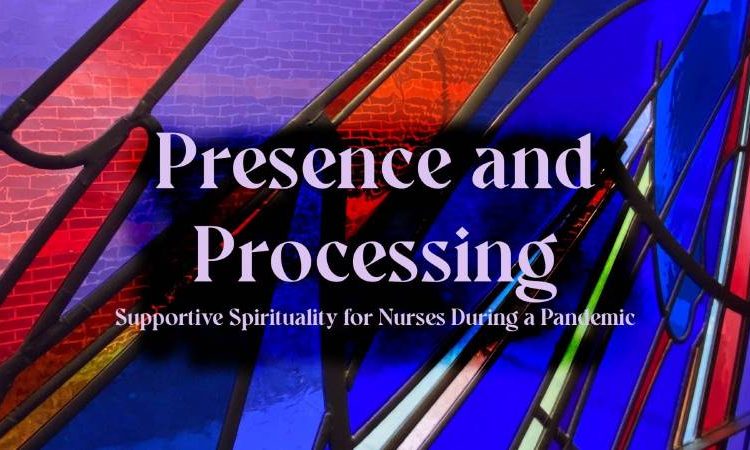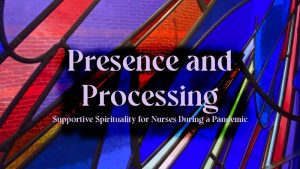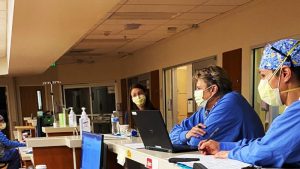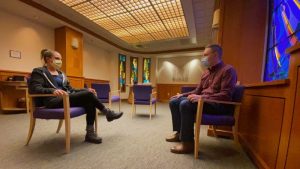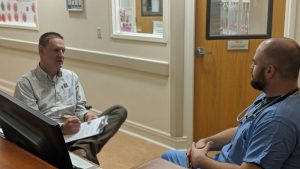Explanation of the Project
What began as an attempt to understand how spirituality could be an asset to healthcare staff evolved during the COVID-19 pandemic into interventions to embrace spirituality as a critical resource for nurses. Through two years of research by literature review, observations, interviews, and support efforts to staff, I have learned that a ministry of presence and opportunities processing can positively impact healthcare culture. As a chaplain, I deliver care through a ministry of presence. Theologically, presence is grounded in a biblical account of Jesus as a companion to two disciples on the road to Emmaus. That account powerfully pictures two practices I utilized with nurses: reflection and story-telling debrief.
Ministry Context and Challenges
Since 1960, Longmont United Hospital has operated as a community hospital. The hospital increased access to comprehensive medical specialty services and pioneered holistic resources for the Longmont community. In 2016, it completed a merger with Centura Health, an integrated health delivery network. Participation in larger healthcare systems often necessitates budget optimization, including reducing resources. As some resources for staff well-being changed, increased workloads led to fatigue and stressors. With exhaustion growing and the COVID-19 pandemic emerging, many caregivers and frontline responders faced anxiety and burnout. Challenges like these present opportunities to positively and spiritually support staff through processing difficulty, reflection and story-telling debrief.
Through interviews, focus groups, and staff meeting observations that engaged over 60 nurses and ancillary staff, I determined:
- 100% felt that spiritual resources should be available to healthcare staff
- 44% thought there was no time to leave their work area to find spiritual resources
- 48% felt spiritualty helped them connect to patients’ experiences and needs
Struggling to care for patients and families, caregivers and frontline responders have little time to care for themselves. Nurses work to integrate their meaning and values with distressing encounters and demanding workloads. They hope chaplains will bring spiritual care to them during critical incidents. Those challenges and the invitations of unit leadership compelled me to provide direct spiritual support to critical care nurses.
The Project
A simple initiative was born from the literature, observations, and feedback: a collaboration with departmental leadership to offer interactive and caring spiritual support to critical care nurses. The broader effort would be a matter of “making rounds,” or walking the halls, spending time in departments, talking with and helping staff. As a chaplain, I approached rounds as a way of being present to those in need. “Rounds” includes check-ins with meaningful questions, listening to concerns, encouraging staff, and addressing the well-being of staff. I hoped to integrate this into the standard workflow and social collaboration on the unit(s). I came in early to shift changes to be present on the floor, show up with refreshments, or swung by if there was a lunch celebration for a new birth or marriage. Developing a trusting foundation for ministry and establishing a relational currency requires visibility, accessibility, and trust. Moving beyond rounding, I used two distinct caring procedures:
- 1:1 Spiritual companionship and support with interested ICU nurses utilizing a reflective and story-telling model to understand meaning, purpose, and values in service to others
- 1:1 Debriefing traumatic patient encounters, including complex deaths, with ICU nurses
Many nurses experience healthcare burnout and need support. Engaging well-being improves staff morale, enhances resiliency, and transforms the culture. While there are limitations for direct spiritual support during rounds, chaplain support through individualized consultations to staff leads to positive effects on the unit.
The Picture of Companionship and Presence
The biblical account of two disciples who experience Jesus’ companionship in Luke’s Gospel compels me to minister to healthcare staff through companionship and presence. Two men traveling on the road to Emmaus recount the shocking and painful news surrounding the crucifixion of Christ. However, their sullen journey is interrupted by a stranger. The new companion walking with them is Christ, but they do not recognize him. Christ asks them why they are sad, and they report the dark events of Christ’s death. Christ reassures them the events have meaning. When they arrive at the village, Jesus agrees to have dinner with them; blesses and apportions bread, and they eat together. As they eat, they realize their traveling companion is actually Christ. Amid the pain, the two travelers receive comfort and hope through the warming presence of God. When we go through dire events, grace can meet us through others’ company, supporting our human needs. Jesus engaged others with genuine care to alleviate their pain and offer hope.[1] We are called to be accessible and actively engage with those we serve. Ministry of presence refuses, “to do anything other than be with those Jesus taught us to be loved by—that is, those we ‘help’ by simply being present.”[2] The “ministry of presence” is a repeated phrase among some chaplains to describe how they work — with or without words — to be a mechanism of God’s love toward others. This is how I approach nurses, and I offer care through listening, reflection, story-telling, and debriefs.
Reflection and Story-Telling Questions
I offered support individually with nurses and with larger groups as needed. The interactions occurred as 30-minute “consultations” in the hospital chapel, in the critical care unit, and through digital remote offerings. Some interventions in the ICU were for critical incident debriefs[3] (traumatic encounters). However, individual engagements focused on discussion with nurses concerning how they handled challenging situations and their spiritual well-being while serving patients. Questions I employed were partly inspired by inquiry approaches like that of Chaplain Neil McKenna at Cape Breton Regional Hospital[4] and included:
- What does spirituality mean to you?
- What gives meaning to my life?
- What greater purpose does my service provide?
- What spiritual resources do I bring to my work as a nurse?
- How can this experience (disruption) be a part of my story?
I collaborated with nurses to consider what compels and sustains them. Additionally, those encounters helped reframe situations and process growth opportunities. As nurses reflected on challenging experiences, including COVID-19 patients, and considered personal values and meaning, they found relief and insight. For the nurses, self-awareness—recognizing what inspires them and, their view of self, others, and God—can ground their service to others. For healthcare staff and chaplains alike, this awareness helps us know what we are, what we have, what we bring, and what we seek. We are then far more compassionate with ourselves and with the people we serve.
A Moment of Breakthrough
Alice[5] had seen few deaths in her tenure as a young critical care nurse, but that changed with COVID-19. Some COVID patients passed away rapidly, others suddenly turned for the worst, and others could not connect with their loved ones due to social distancing. As Alice took care of Stephen, she noticed that he was alone and anxious. Often on a respirator, communication was difficult. As things escalated, it was evident that Stephen would die with no family support in the unit. Alice wanted to do anything possible to alleviate suffering and assist in comforting Stephen. Stephen made references to his spouse of 44 years. It was distressing and saddening for Alice not to facilitate a visit with his spouse—the care he deserved. Ultimately, a phone call and remote connection were made available for contact through the time of death.
Upon being contacted by a relief chaplain, a shift manager, and the critical care nurse leader, I reached out to Alice. We did not connect during that shift, but as she returned for her next shift, I was there to debrief her difficult encounter. I invited Alice to vent some of her thoughts and emotions associated with the event. “I felt like I had very little to offer Stephen when he was in need. I didn’t like the way I felt watching someone suffer alone.” I offered Alice space to share how her care for Stephen and his death impacted her. We unpacked the fears and frustrations and then also addressed some of the physiological, emotional, cognitive, and spiritual symptoms she might encounter in the coming days. I remember she mentioned that she was already thinking of her father and was anxious for his health and well-being with COVID-19 risk factors. Alice remarked, “Even though I was exhausted, I had trouble sleeping after my shift because I kept seeing Stephen’s face.” Alice and I made a plan for her to have a check-in with the unit manager, use an employee assistance counseling program, access some self-care techniques, and chaplain follow-up support. That contact expanded into a few more encounters that included an opportunity to unpack the reasons that inspired Alice to become a nurse. With spiritual support, Alice has expressed why she cares about people and what that means to her at a deeper level.
Findings & Insights
Through research, interaction with nurses, and reflection, I discovered spiritual support to caregivers, and frontline responders is essential. I learned that persistent and optimistic spiritual resources could reinforce resiliency in units overwhelmed with patient needs. Spiritual support to staff through the ministry of presence during the COVID-19 pandemic boosted morale and well-being. Nurses thanked me for coming by after patient deaths, long shifts, and poor prognosis situations. Nurses carry their encounters with patients. When a chaplain asks a nurse to reflect on impactful encounters, many emotions bubble to the surface. As a chaplain, I discovered that nurses appreciate having someone to hear these harrowing stories. Processing those events and integrating spirituality was like a pressure relief valve for some of the nurses. When we highlight the value of spirituality—our meaning, values, purpose, connectedness to God and others—nurses are permitted to express themselves and deeper meaning. One nurse said, “It’s hard to come in and do this [critical care nursing] work feeling tired and unsure of what the future holds. Having the chaplains ask me how I feel and what I need is a real gift.” Perhaps this is what I have found to be most important about the research and the work: the presence of the Divine can be experienced through the spiritual care and support of companions during adversity and pain.
[1] See Jn. 4:1-26 and for a historical perspective on this language, see Darrell L. Guder, “Incarnation and the Church’s Evangelistic Mission,” International Review of Mission 83 (1994): 417–28.
[2] Stanley Hauerwas and Jean Vanier, Living Gently in a Violent World: The Prophetic Witness of Weakness (Downers Grove, IL: Intervarsity Press, 2008), 56.
[3] CISD is a crisis intervention technique organized under Critical Incident Stress Management. It is a supportive, crisis-focused discussion of disrupting and traumatic events. It aims to stabilize disruption, reduce distress, and restore group cohesion and wellbeing. For information about CISD see http://www.info-trauma.org/flash/media-e/mitchellCriticalIncidentStressDebriefing.pdf
[4] Kenneth A. Bryson, “Spirituality, Meaning, and Transcendence.” Palliative & Supportive Care 2, no. 3 (2004): 324.
[5] Names and contextual details altered to protect personal identifying information.
